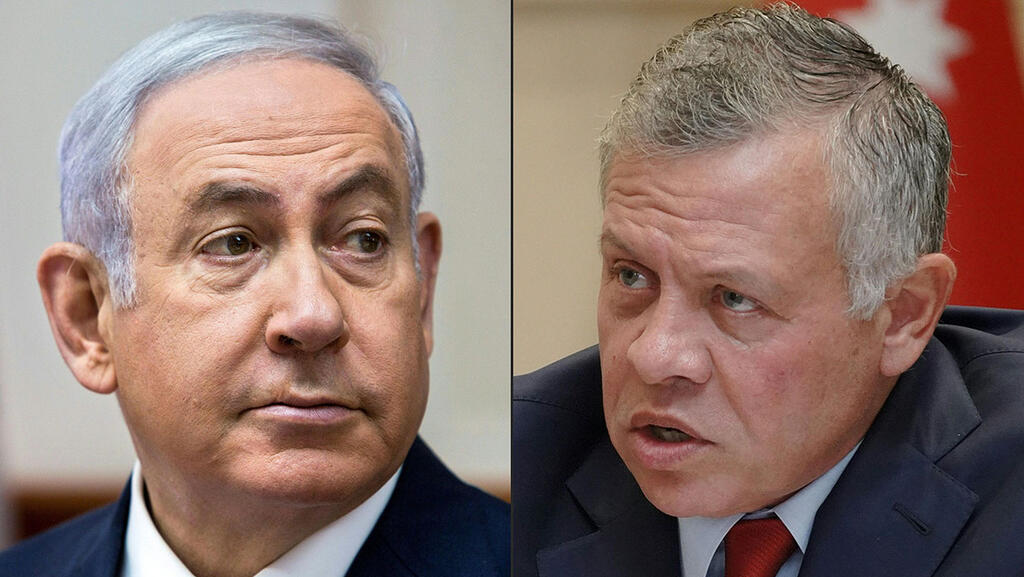Official Jordan has been unusually silent about the results of the Israeli elections. Neither the government nor the palace has uttered a word in any direction about the return of former Israeli Prime Minister Binyamin Netanyahu to power.
Former Jordanian Air Force Maj. Gen. Mamoun Abu Nuwar says it was highly likely that Jordan would not engage much with the new government in Israel.
“I think His Majesty will continue to boycott Netanyahu. The king believes that it is impossible for the former Israeli prime minister to change for the better,” Abu Nuwar says. “It is part of his DNA and most likely he will become more aggressive based on his new far right-wing partners.”
Jordan has invested strategically with Israel in terms of cooperation on water, gas, and energy, and it is unclear if this will change much even with Netanyahu back in office.
Ahmad Awad, a leading economic expert in Jordan, says that the results of the election would have strong implications for Jordan. “This is not to say that the previous government was much better,” Awad said, “but there is clearly now a struggle in Israel between the right and the far right, and this will have a negative effect on the potential of relations between the two countries.”
Hamadeh Faraneh, a columnist in Jordan’s Ad-Dustour daily, wrote that the problem was not in Netanyahu alone but in those who would be in his coalition. He argued that Netanyahu spearheaded the “racist” nation-state law, pushed then-US President Donald Trump into moving the US Embassy to Jerusalem and canceling US aid to the UN Relief and Works Agency for Palestine Refugees, and supported President Trump’s Peace to Prosperity plan that included the Israeli annexation of Palestinian territory.
“The concern, however, is with the unhinged far right, which has not been accountable to anyone in terms of their political, security or legal dealings with Palestinians in the 1948 areas or those in the 1967 territories,” he wrote in his daily column, referring to Palestinian citizens of Israel within the pre-1967 Green Line borders and Palestinian residents of the territories conquered in the 1967 Six Day War, respectively.
Jordanian political expert Tagreed Odeh says that the results of the Israeli election have produced much speculation about the future of relations between Jordan and Israel. “Of special concern is what will happen to the holy places in Jerusalem that are under the custodianship of King Abdullah II,” he says.
3 View gallery


Muslim worshipers fly Palestinian, Hamas flags on Al Aqsa Mosque compound
(Photo: AFP)
People still remember the “uneasy situation” that faced Jordan’s Crown Prince Hussein when he wanted to visit Al-Aqsa Mosque. “Clearly the relationship has reached a dead end and no diplomatic effort will be able to heal it,” Odeh says.
Over the past month, the Jordanian government was very worried about the election and encouraged Palestinian citizens of Israel to exercise their right to vote. The last-minute breakup of the Joint List, the leading secular Arab list, caught Jordan and others off guard. Although the turnout among Arab voters reached 55%, the failure of Balad, the Palestinian nationalist party headed by parliamentarian Sami Abu Shehadeh, to reach the 3.25% threshold meant that 138,214 votes were wasted. Similarly, the left-wing party Meretz’s failure to cross the electoral threshold wasted 150,740 votes, many of them from the Arab community.
Faraneh dedicated a second column in Ad-Dustour to the wasted votes due to the absence of agreement among the Arab lists. He argued that, had they been united, they could have elected 15 members of the 120-seat parliament and prevented Netanyahu from forming a majority coalition and returning to power.



